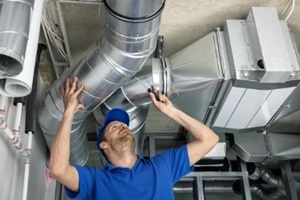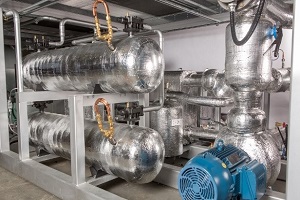 Among many responsibilities, ensuring the efficient and safe operation of HVAC systems is a key obligation of building managers and owners. One of the major components serving a significant role in the maintenance of these systems is the use of glycol.
Among many responsibilities, ensuring the efficient and safe operation of HVAC systems is a key obligation of building managers and owners. One of the major components serving a significant role in the maintenance of these systems is the use of glycol.
Propylene glycol is an integral chemical in HVAC applications across the northeast where winter temperatures frequently drop below freezing. By lowering the freezing point of water, glycol prevents pipes and equipment from being at risk in the cold.
This article will examine how propylene glycol enables heat transfer and protects components in closed-loop systems, cooling towers, and chillers.
What Are Some Common HVAC Applications For Glycol?
Glycol proves essential for allowing water-based cooling systems to operate through freezing conditions by preventing burst pipes, equipment icing, and loss of performance in chillers, cooling towers, and chilled water distribution.
Closed Loops
Chilled water loops circulate water year-round to provide cooling to a building’s air handlers and other equipment. During winter, if piping is exposed to outside air, there is a risk of pipes freezing and bursting when outdoor temperatures drop below the water’s freezing point.
Adding propylene glycol to the chilled water also lowers its freezing point below the expected winter minimum temperature, allowing the distribution pipes to keep flowing even in frigid conditions. Glycol also prevents slushing, which occurs when ice begins to form but does not completely freeze, impeding flow through the pipes, and in turn forcing your pumps to work harder.
Cooling Towers
For cooling towers that operate continuously through the winter instead of seasonally, glycol may also be used. During cold weather, glycol lowers the freezing point of the circulating water so ice does not accumulate in the fill or sump.
Preventing freezing protects the tower from frost damage, allows for proper water distribution, and maintains heat transfer efficiency by avoiding mineral scale formation that occurs when water evaporates but cannot drain from the system.
Chillers
Chillers require glycol when at risk of water freezing, such as in cold climates, when producing chilled water below 45°F, or supplying air handlers with below-freezing coil temperatures.
Water-cooled condensers also need glycol to stop expansion damage from freezing. Any chiller application allowing water to drop below its freeze point should use glycol to keep the system operational and avoid equipment damage during winter.
Glycol Best Practices & Key Maintenance Steps
 As buildings in the northeast rely heavily on propylene glycol to avoid HVAC disruption in frigid conditions, undertaking measures to ensure correct glycol use is essential.
As buildings in the northeast rely heavily on propylene glycol to avoid HVAC disruption in frigid conditions, undertaking measures to ensure correct glycol use is essential.
This includes following recommended concentrations, testing and monitoring inhibitor levels regularly, and flushing your system when necessary. When applied and maintained properly, propylene glycol is an indispensable fluid that keeps heating and cooling operations running smoothly through the coldest northeast winter.
Concentration
Propylene glycol concentration should be checked regularly, such as before the start of each cooling season, to ensure the solution provides adequate freeze protection. A glycol refractometer is the most accurate way to test concentration, but glycol test strips can also be used for a quick reading.
The ideal propylene glycol concentration for HVAC applications is 30-50% by volume, which provides freeze protection down to -15°F to -60°F depending on the exact percentage.
The concentration percentage is also important because too little glycol will not prevent freezing, while too much can impede heat transfer, increase pump strain, and lead to additional efficiency issues. Keep an eye out for leaks in your system that could potentially allow fluid to escape or allow air or moisture to degrade your glycol mix.
Monitoring & Replacement
Glycol solution contains corrosion inhibitors that prevent fluid degradation of system metals when maintained properly. In addition to testing inhibitor levels every 3-6 months, glycol’s pH and presence of contaminants should also be checked.
Glycol pH should fall between 7.0-9.5, and contaminants like sediment, biofilm or oil will reduce effectiveness. If inhibitors drop below 30-50% of initial concentration, if the pH is outside the acceptable range, or if contaminants are present, the entire glycol charge should be replaced to prevent corrosion, biological growth, and loss of heat transfer capability. Using a reputable lab to analyze glycol samples can help determine if replacement is needed.
Regular System Flushes
If glycol begins to break down toward the end of its lifecycle, a full system flush should be performed to remove old glycol, and prevent buildup of particulate contaminants within the system. Flushing circulates fresh water through the system to wash away sediment, scale, oils, and other debris that can accumulate over time.
It also removes any biofilm growths that can inhibit flow and heat transfer, or contaminate future refills. It is important to understand that when flushing, if any glycol residue remains in the system, it will continue to break down, altering the chemistry of the water in your pipes. Chemical cleanings can be performed in these situations, as opposed to just using water, to prevent glycolic acid.
Why Work With A Professional?
 Partnering with professional water treatment companies provides the testing, chemicals, and expertise required to properly maintain your HVAC glycol. Their extensive knowledge, lab relationships, routine assessments, and preventative recommendations keep your system running at peak efficiency, and help avoid expensive repairs.
Partnering with professional water treatment companies provides the testing, chemicals, and expertise required to properly maintain your HVAC glycol. Their extensive knowledge, lab relationships, routine assessments, and preventative recommendations keep your system running at peak efficiency, and help avoid expensive repairs.
Trusting glycol maintenance to experienced water treatment specialists ensures your HVAC system continues operating reliably through freezing weather. At Tower Water, our ability to combine our expansive reach with a personal touch helps set us apart, ensuring that each client feels valued.
Our seasoned professionals are adept at guiding you through every facet of cooling tower operation. We pride ourselves on being a one-stop solution for all your water treatment needs, crafting tailored solutions that directly address your unique challenges.
Contact Tower Water today, at 212.518.6475, or toll-free at 212.518.6475, or schedule a consultation online to explore the array of water treatment services we offer.
